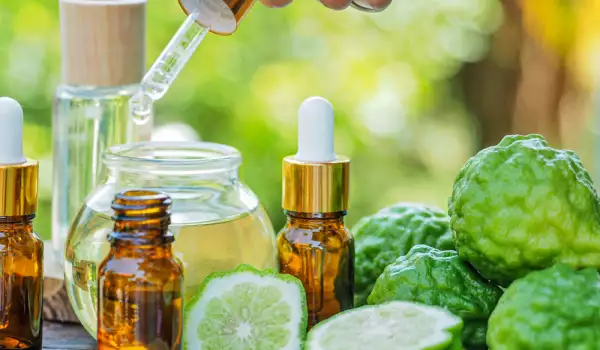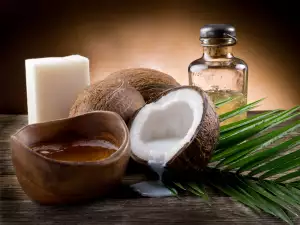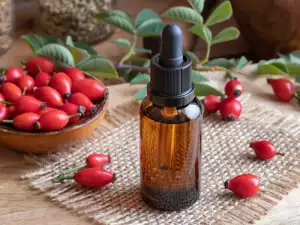The psychology of aromas is one topic that often remains to the side when determining the beneficial properties of various essential oils. The aroma emitted by these natural gifts is important for good health by preventing stress, fatigue and increasing the tonicity of the body.
By inhaling the aroma of Bergamot essential oil, the lungs are filled with a magical scent that restores the wonderful mood, guarantees a high tonicity during the day and a restful night's sleep. This is not the only benefit of the bergamot plant extract. Its benefits are numerous and should be known and used.
Origin and production of bergamot essential oil
The birthplace of the bergamot tree, which is the raw material for obtaining the oil, is Southeast Asia. It is currently also distributed in Italy, Ivory Coast, Morocco, Tunisia and Algeria. It reaches 4 meters in height and has star-shaped flowers and smooth leaves. Its fruit look like a cross between an orange and a grapefruit and are pear-shaped. When the fruit is ripe it has a green or yellow color.
Wild bergamot is harvested in the beautiful hills of Sicily and takes its name from the city of Bergamo in Lombardy. The peel of the fruit is pressed to obtain this wonderful aromatic oil. Similar to orange, bergamot is a popular citrus aroma in cosmetics and personal care products.
The peel of both ripe and unripe fruit is used to extract the oil, the amount extracted being about 0.5 percent of the total mass.
The product has a sweet but spicy, fresh, slightly harsh, citrusy, green aroma and is used as a main scent in perfumery. It is associated with the notion of beauty and finesse, the result of the harmonious combination of its various ingredients. Combines well with essential oils from jasmine, lavender, sandalwood, cedar, ylang-ylang, grapefruit, geranium, neroli.
Chemical composition of bergamot oil
Bergamot oil contains different chemical ingredients such as limonene and alpha pinene with antidepressant action, stimulating the nervous system. This improves blood circulation and stimulates the metabolism, nutrient absorption and lowers blood sugar. Other ingredients are myrcene, linalool, neroli, geraniol, terpineol and other rare substances with a positive effect on the nervous system.
Benefits of Bergamot Oil
Relieves depression

There are many signs of depression, such as fatigue, being sad, low libido, lack of appetite, feelings of helplessness and disinterest in everyday life.
Each person experiences this condition differently. Natural remedies for depression are effective and get to the root cause of the problem. Bergamot is known for its ability to increase vitality, give a feeling of freshness and increase energy by improving blood circulation. Essential oil of bergamot is an effective agent when rubbed and inhaled and strengthens the tonicity and the surge of energy.
Lowers blood pressure
Bergamot oil helps maintain metabolic levels by stimulating the production of hormonal secretions, digestive juices, bile and insulin. The oil stimulates the digestive system and allows nutrients to be properly absorbed. Bergamot oil, in combination with lavender and ylang ylang oil, can be used to reduce psychological stress responses, cortisol levels and blood pressure levels.
Prevents and fights infections
Bergamot oil helps stop the growth of bacteria and fungi. It is successful in treating candida infections. The components of bergamot, especially linalool, are effective against the most common foodborne pathogens.
Relieves stress and anxiety
Bergamot oil is a great relaxant. It reduces nervous tension and relieves stress. It can be used as a diffusion or applied topically to specific areas.
Relieves pain
This essential oil is a great way to reduce the pain of sprains, muscle aches and headaches. It is applied topically and its action is enhanced if combined with coconut oil.
Heals the skin
Bergamot oil has soothing, antiseptic, antibacterial and anti-inflammatory effects, making it suitable for skin care when applied topically. It can remove scars and spots on the skin, tone it and soothe skin irritations.
Supports digestion
In traditional Chinese medicine, bergamot peels and the whole fruit of the plant have been used to treat indigestion. Bergamot oil is known to stimulate digestive juices and have soothing properties and it can be helpful in fighting food poisoning due to its antibacterial action.
The oil is a natural deodorant
Bergamot oil prevents the development of microbes that cause body odor. The refreshing and citrus scent makes it a suitable natural deodorant and air freshener. The strong aroma eliminates odors on the body or in the room.
To reduce fever
Bergamot essential oil fights infections caused by harmful bacteria. It also reduces fever, relieving stress and stimulating the secretion of hormones. The feeling of warmth that occurs when cortisol levels are elevated leads to sweating and increased body heat and bergamot helps reduce cortisol levels, thus helping to reduce fever in some cases.
Oral health
The oil removes germs from the mouth and can therefore be used as a mouthwash. It also protects teeth from developing cavities thanks to its anti-microbial properties.
Heals respiratory diseases

Bergamot essential oil has antimicrobial properties, so it can help eliminate pathogens that lead to respiratory infections. It is useful for common cold and works as a natural home remedy for cough.
Helps lower cholesterol
Bergamot oil can help lower cholesterol naturally. Bergamot extract has been scientifically proven to help lower cholesterol, triglycerides and bad cholesterol levels and increase good cholesterol.
Contraindications for the use of bergamot oil
Citrus essential oils are extracted through a cold-pressed process and can cause photosensitivity, which manifests itself in the form of redness, hyperpigmentation or rashes, depending on the degree of reaction of the body.
Bergamot has the highest photosensitivity among citrus oils, but this oil is free of furocoumarins, which are the main causes of high photosensitivity and is low risk. However, it is recommended to avoid applying the oil to the skin before sun exposure.
Citrus essential oils are one of the most volatile, which practically means that their fragrance will evaporate the fastest and also means that due to rapid oxidation, their shelf life after opening is short and should be used up to one year.
Tips for internal use of bergamot oil
- If it is necessary to add bergamot to tea, for example, it is necessary to dilute 1 drop of the oil to 100 milliliters of liquid.
- Can be added to your water - 1 drop.
- To enhance the taste of your favorite smoothie, add 1 drop of bergamot essential oil to it.

















Comments